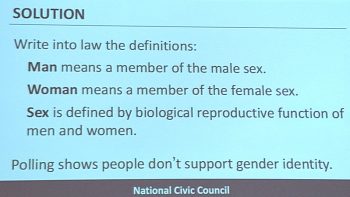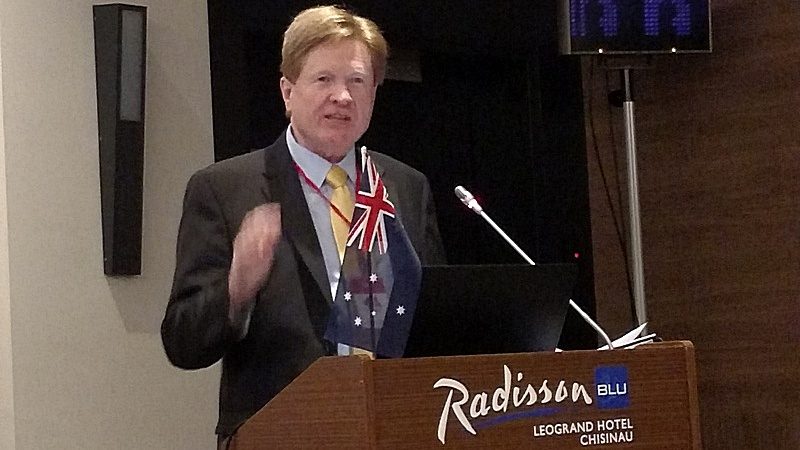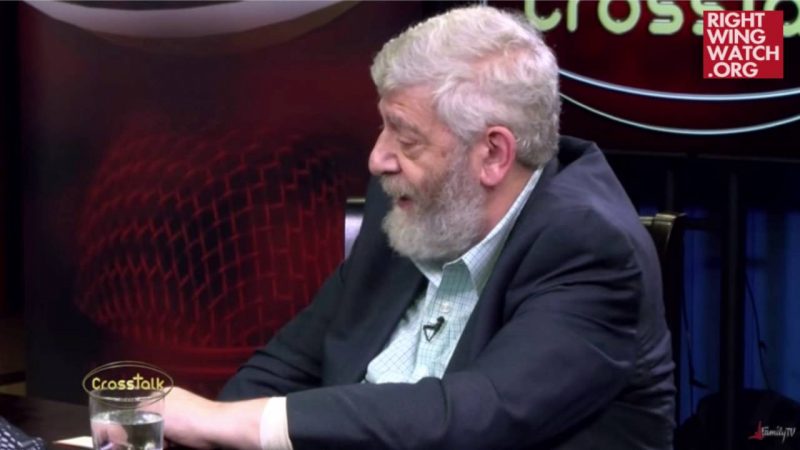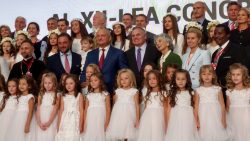Among the breakout sessions at the World Congress of Families global summit in Moldova last Friday and Saturday was a panel on “Gender Ideology – The Latest Attack on the Family and the Legal Challenges It Poses.” Like the conference as a whole, the “gender ideology” panel brought U.S. Religious Right activists together with counterparts from Russia and Europe to denounce “myths” about what they portrayed as an authoritarian liberal political ideology around sexuality, sexual orientation, and gender identity.
The Family Research Council’s Peter Sprigg walked the audience through a PowerPoint presentation on “Five Myths of Gender Identity,” which argued that transgender identity is unscientific. He denied that gender transition is ever medically necessary or that discrimination on the basis of gender identity is a form of sex discrimination.
Sprigg’s final “myth” was that the transgender movement is a progressive movement—an odd topic to take on in a setting where “progressive” is a dirty word. Sprigg claimed that many self-identified gays and lesbians are “concerned about the T” because “masculine girls and feminine boys who at one time might have grown up to identify as lesbian women or as gay men are now being told that they are actually the opposite sex.” He also positioned himself, as others on the Right have done, in alliance with some feminists—so-called TERFs—who argue that trans activists are not trying to overcome gender stereotypes but instead are “trying to conform to rigid gender stereotypes of the opposite sex.”
“It would seem more progressive,” said Sprigg, “to simply say that there are different ways to be a boy or a man, and different ways to be a girl or a woman, and none of them require changing your gender or mutilating your body.”
The other American on the panel was Stephen Baskerville, a professor of government at Patrick Henry College, which was founded in 2000 by homeschooling activist Michael Farris, who now heads the Alliance Defending Freedom while remaining chancellor emeritus and professor of government at Patrick Henry.
Baskerville is promoting his book, “The New Politics of Sex: The Sexual Revolution, Civil Liberties, & the Growth of Governmental Power.” After the panel, I picked up a copy. While I haven’t had time to read it yet, I note that among those providing back-cover blurbs is anti-gay activist Austin Ruse, who resists international recognition of the rights of LGBTQ people. Ruse’s blurb reads: “In this new and vitally important contribution to the analysis of the Sexual Revolution, Stephen Baskerville shows how we have become a nation of beta-male Pajama Boys; how it was intentional, where it has taken us, what it portends, and how even conservatives have missed it.”
At the WCF, Baskerville said that sexuality has become a political ideology that is neither about freedom nor equality, but power and authoritarianism. He warned of “dangerous consequences” to the conservative movement’s failure to identify what it is up against.
“The ubiquitous demand for power and empowerment indicates that what we are up against here is something very similar to the movements such as communism or fascism in the last century, and more recently Islamism…”
Baskerville’s comments took a detour into Men’s Rights Activist territory when he declared, “The divorce machinery is the most authoritarian governmental machinery ever created in the English-speaking democracies … It is the model for every other form of authoritarianism that is being used against Christian activists and pro-family activists.”
A speaker who had not been listed on the program was Andrei Tsyganov, an anti-gay activist from St. Petersburg who runs a website called Katyusha. He called “anti-family ideology” a threat to human civilization, and he defended the “propaganda” law adopted in St. Petersburg and then nationally, which has been used against LGBT activists and organizations.
Tsyganov bragged that officials in St. Petersburg have been able to use the propaganda law, and a law against civil society organizations deemed to be foreign agents, to stop pro-LGBT activities. Demonstrating the propensity of some anti-gay activists to equate homosexuality and pedophilia, he accused Great Britain of funding Russian organizations that he said promoted pedophilia.
Christians, he said, have been told a “myth” that they need to be tolerant and obedient. Evil should be opposed, he said, because only if it opposed will it be defeated.
Tsyganov’s website has run its own report on the WCF, which calls Moldovan President Igor Dodon a “hero” for promising to “ban the parade of pederasts” and promoting other “measures to support the family.” Tsyganov calls Russia “the sole guarantor of traditional values and morality in the world,” language similar to that used by American Religious Right figures enamored of Putin’s anti-gay policies.
Another Russian speaker, Olga Letkova, warned that feminist ideology is “very dangerous” because it is the first step toward eliminating boundaries and blurring the borders between male and female that were created by God. She talked about mobilizing parent organizations to fight a proposed law on gender equality, and about resisting sex education in schools, which she said is meant to impose tolerance of “perversions.” She called for people to fight against “ideology aggressively imposed by globalist international structures.”
Xavier Blandin, a Frenchman representing WCF’s parent organization, the International Organization for the Family, cited feminist Simone de Beauvoir’s statement that “one is not born, but rather becomes, a woman” as the root of recent feminist currents. He quoted from the book of Genesis to argue on behalf of the complementarity of the sexes, and to explain why he, “as a Christian as well as a citizen,” fears gender theory and gender studies. It is painful, he said, for Christians to see marriage, a “pillar of our faith,” attacked. If you destroy filiation, he said, you pave the way for medically assisted procreation for homosexual women, and for women gestating babies for others, which is a moral threat to society.
“We have to remain strong on our principles,” he said, as well as open and merciful, to “save our humanity” from “the disaster of individualism” and “aggressive liberalism.”
The session’s moderator, Patrick Byrne, is president of the National Civic Council in Australia and author of a new book, “Transgender: ne shade of gray,” about “the political ideology of transgenderism.”
The book argues that laws that “prioritise the transgender world view” come “at the expense of the inherent rights of those who recognize the biological reality of male and female sex as inherent and immutable.”
“Today, in the name of equality, transgender laws create inequalities and divisions,” concludes Byrne. “In the name of diversity, uniformity is imposed. Under the banner of protection from discrimination, authoritarian laws are imposed.” At WCF, Byrne decried what he described as the medicalization and industrialization of the social construct of transgender identity.
“I’m not here to winge,” he said, arguing that the solution is to put definitions of sex and gender into law, and “if you do that, you block the whole agenda.”

After the panel, Sprigg handed me a copy of a 46-page booklet he wrote for the Family Research Council, published this year, called “How to Respond to the LGBT Movement.” It includes an introductory note from FRC President Tony Perkins saying he hopes it will “be helpful in protecting future generations from the dangers of the progressive agenda for your family, your community, and our country.”
In the pamphlet, Sprigg explains that he avoids using words like gay or lesbian without qualifiers like “people who identify as” because using the words by themselves implies accepting the reality of an identity that he says is “empirically false.” That has been Sprigg’s line for some time; he made a similar point in 2015, when the WCF was trying to soften its image on LGBTQ issues and FRC co-sponsored a separate one-day gathering on the eve of the official event for people who wanted their homophobia full strength.









